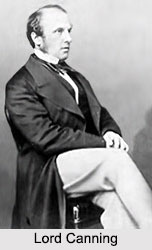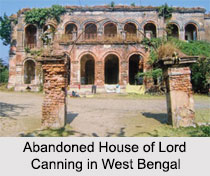 Lord Canning served as Governor General of India from 1856 to 1862. During his tenure, the Government of India Act, 1858 was passed which created the Office of Viceroy to be held by the same person who was Governor General of India. Thus, Lord Canning also served as first Viceroy of India and the last Governor General of India.
Lord Canning served as Governor General of India from 1856 to 1862. During his tenure, the Government of India Act, 1858 was passed which created the Office of Viceroy to be held by the same person who was Governor General of India. Thus, Lord Canning also served as first Viceroy of India and the last Governor General of India.
Early Life of Lord Canning
Born on 14th December in 1812 at Brompton, London; Charles John Canning was the third son of the famous statesman George Canning. He was educated at Christ Church, Oxford where he graduated B.A. in 1833, as first class in classics and second class in mathematics.
Political Career of Lord Canning
In 1836, Lord Canning entered parliament, being returned as member for the town of Warwick in the Conservative interest. His first official appointment was that of Under-Secretary of State for Foreign Affairs, in the administration formed by Sir Robert Peel in 1841, his chief being the Earl of Aberdeen.
This post he held till January 1846; and from January to July of that year, when the Peel administration was broken up, Lord Canning filled the post of First Commissioner of Woods and Forests. He declined to accept office under the Earl of Derby; but on the formation of the coalition ministry under the Earl of Aberdeen in January 1853, he received the appointment of Postmaster General. In this office he showed not only a large capacity for hard work, but also general administrative ability and much zeal for the improvement of the service. He retained his post under Lord Palmerstone"s ministry until July 1855, when, in consequence of the departure of Lord Dalhousie and a vacancy in the Governor Generalship of India, he was selected by Lord Palmerstone to succeed to that great position.
 Major Events during Lord Canning"s Period
Major Events during Lord Canning"s Period
The most significant event during Lord Canning"s administration was the outbreak of the Sepoy Revolt, 1857. Lord Canning suppressed it and the Parliamentary Act of 1858 followed this great event. By the Proclamation of the Queen, the East India Company"s rule ended and the Crown of England took over the Government of India. Lord Canning meted out punishment to those who had taken part in the uprising, yet he avoided indiscriminate vengeance on the Indians as far as possible and thus earned the title of "Clemency Canning". He restored law and order in an effective way and introduced a new system of administration.
While rebellion was raging in Oudh, Lord Canning issued a proclamation declaring the lands of the province forfeited; and this step gave rise to much angry controversy. A secret despatch, couched in arrogant and offensive terms, was addressed to the viceroy by Lord Ellenborough, then a member of the Derby administration, which would have justified the Governor General in immediately resigning. But from a strong sense of duty he continued at his post; and the general condemnation of the despatch was so strong that the writer felt it necessary to retire from office.
Lord Canning replied to the despatch, calmly and in a statesman-like manner explaining and vindicating his censured policy, and in 1858 he was rewarded by being made the first Viceroy of India. In April 1859, he received the thanks of both Houses of Parliament for his great services during the mutiny. He was also made an extra civil grand cross of the Order of the Bath, and in May of the same year he was raised to the dignity of an Earl, as "Earl Canning".
Lord Canning reorganized the British Indian army and restored financial stability by introducing "Income Tax", a uniform tariff of 10 percent and a convertible paper currency. To remove certain grievances of the cultivators of Bengal under the Permanent Settlement passed the "Bengal Rent Act" in 1859 to give better security to the tenants. The British started tea and coffee plantations. The recommendations of Charles Wood on education made in 1854 were given effect and the three universities of Calcutta, Bombay and Madras were founded in 1857. He appointed a commission to enquire into the grievances of the peasants of Bengal and Bihar against the European Indigo-planters. Acting on the recommendations of the commission he greatly curved the highhandedness of the planters. The "Indian Penal Code" framed by Lord Metcalfe, was introduced and the "Criminal Procedure Code" appeared in 1861. In the subsequent year, the old Supreme Courts and Company"s "Adalat" were replaced by High Courts in three Presidency towns. One of the important events towards the end of Lord Canning`s administration was the passing of the "Indian Council Act" of 1861 by which non-official Indian members were nominated to the Viceroy"s Legislative Council.
Worn-out by the heavy and demanding tasks during the war of 1857 and after, Lord Canning retired and left India on 18th March 1862. A few months after his return to England, he died on 17th June 1862 and was buried in West Ministers Abbey. About a month before his death he was created a "Knight of the Garter".






































